RetroLisa
---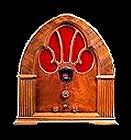 | Life During World War II | |
|
___________________________________________________________________________________________________________
|
|
|
RetroLisa
| _______________________________________________________________ | __ | _________________________________ | _______ | On The Homefront
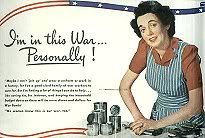
I'm in this War...Personally!
Maybe I can't "join up" and wear a uniform or work in a factory, for I've a good-sized family of war workers to care for. But I'm finding a lot of things I can do to help....like saving tin, for instance, and keeping the household budget down so there will be more dimes and dollars for War Bonds!
We women know this is our war, too.
rationing
Roses are red, violets are blue.
Sugar is sweet. Remember?
--Walter Winchell
Our most important resources were strictly rationed during the war. Items like sugar, coffee, butter, beef and canned goods were assigned point values and were redeemed with ration stamps.
The Office of Price Administration (OPA) issued ration books to every American citizen, even babies. Each stamp had an expiration date and was only good for a short amount of time, usually one month. This prevented hoarding of stamps. Sugar was the first item to be rationed.
Rubber was rationed, making it nearly impossible to get new tires for your car. Motorists were urged to drive under 35 MPH in order to save the rubber on their tires. People with extra unused tires were required to relinquish them under the government's Idle Tire Purchase Plan.
Fabric rationing limited the amount of material that could be used in clothing. This eliminated non-essential features like cuffs, wide hems, full skirts, patch pockets and men's vests.
Gasoline rationing was especially difficult to cope with. Windshield stickers indicated how many gallons you were allowed. Stickers with the letter "A" provided the average civilian with three to four gallons per week. People with jobs that were considered essential, such as doctors or defense plant workers, received "B" or "C" stickers and more gallons. Truck drivers displayed their "T" stickers and were entitled to an unlimited amount. After all, our nation's supply lines must be kept open!
Truckers and motorists with "C" stickers were required to have their tires inspected on a regular basis in order to qualify for renewed gas ration books. Many gas stations doubled as official tire inspection stations. "C" stickers were often counterfeited and sold on the black market. 4,000 service stations lost their business licenses for being part of this scam.
Gas Rationing
War Ration Books
The ABCs Of Gas Rationing
Rationing in Britain
WWII Rationing
ladies at work
The jobs that were left vacant when the men went to war were filled by women. Soon, traditionally all-male occupations like factory work and machine repair were being handled by the ladies. Women enjoyed the new social and economic freedoms that resulted, and the character of Rosie The Riveter became an icon for working women everywhere.
Rosie The Riveter
American Rosie The Riveter Association
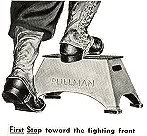
First Step toward the fighting front
--Go Pullman!
Servicemen were given priority on all forms of public transportation. The public was urged to limit personal travel as much as possible to make room for the soldiers. If a troop train was approaching, a civilian train would be moved onto a rail siding to allow it to pass.
Lucky Strike Green Goes To War!
The metal that was used for the green dye on Lucky Strike cigarette packages was needed for the war effort, so they changed their packaging from green to white....and used this fact in their advertising.
Lucky Strike Green Goes To War
loved ones
The sight of the telegram delivery boy sent a wave of fear throughout the entire neighborhood. You prayed that he wasn't coming to your house, because he probably wasn't bringing good news. If a loved one died in the war, the family received a telegram, followed by a letter containing the details. Telegraph companies were forbidden to deliver death notices after 10 p.m.
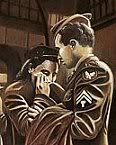
It's hard to say which was worse....the first time he shipped out, or the weekend pass that ended much too soon.
During the war, the number of marriages and births increased dramatically. Young couples tied the knot in a hurry, not knowing what the future may bring. Rather than wait until the war was over, many couples had children right away. These goodbye babies acted as a sort of insurance policy in case the father was killed.
| |

Ration book
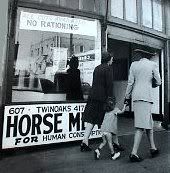
Beef was rationed,
horse meat was not

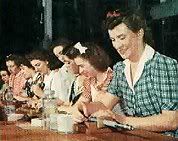

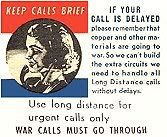
Civilians were asked to keep their phone calls short, and to be aware that some calls may be delayed because of wartime material shortages.
War calls must go through!
|
_________________________________________________
|
|
|
RetroLisa
| ___________________________________________________________________ | __ | _____________________________ | _______ | Doing Our Part
homefront preparedness
After the raid on Pearl Harbor, many towns put emergency disaster plans into effect. Blood banks were established, emergency drills were conducted, and civilian delivery trucks were equipped to carry stretchers. Ordinary citizens volunteered to be air raid wardens and received training in first aid, fire prevention, the use of gas masks and the handling of bombs.
When the air raid sirens went off, this signaled a blackout. Everyone was required to turn off their lights or pull down dark shades. All pedestrians had to be off the streets, and all traffic had to be parked with the lights off. The air raid warden was in charge of making sure this was done.
Coastal cities also had dim-outs, during which only lights facing the sea were shut off. Dim-outs could last for several months at a time. The manufacture of light-blocking shades and curtains became very profitable during this time.
pitching in
bonds
The most important thing an American citizen could do was buy War Bonds. Under this program, every $3 in Bonds purchased during the war could be cashed in for $4 after ten years. It was strongly suggested that each working person join a Pay-Roll Savings Plan and put at least 10 percent of their pay towards War Bonds. "Your comforts and your fun must wait. Your Bonds will buy them all some day....more of them than you can ever buy now."
The purchase of Savings Bonds and Defense Bonds was also encouraged. The Ringling Brothers, Barnum & Bailey Circus offered a free grandstand ticket to any civilian who purchased a War Bond. Every little bit helps!
material drives
Civilians were asked to collect all sorts of things for the war effort. Old ice skates and aluminum pots and pans were turned in at scrap metal drives. The World War I cannons that once adorned city parks were also melted down. The Boy Scouts collected old newspapers. Fibers from milkweed pods were used in life jackets, and many schools held contests and awarded prizes to the kids who picked the most. Occasionally, you could get a free ticket to the movies if you brought in a rubber item or ball of tinfoil.
Even ordinary household grease was saved. One tablespoon of used cooking grease made enough gunpowder for five bullets. It was suggested that housewives save at least one tablespoon a day. Grease and waste fats were kept in a can, which was turned in at the local butcher shop when it was full.
Other objects were also collected, such as silk and nylon hose. Old records were melted down and re-cast to make new records for servicemen.
food
The government asked farmers to dedicate a large portion of their land to growing food for the troops, and to work as many hours as possible to increase production. To assist them, the government brought in busloads of war prisoners to work on the farms. This practice made some farmers a bit nervous, but by most accounts the prisoners were well-behaved and didn't cause any trouble.
Americans were asked to grow as much of their own food as possible. This resulted in the planting of victory gardens. By 1943, victory gardens were supplying us with 40 percent of our vegetables.
Pitching In
propaganda & slogans
"Loose Lips Sink Ships!"
"When you ride alone, you ride with Hitler! Join a car-sharing club TODAY!" (ad for carpooling)
 Lionel Barrymore urges us to buy Defense Bonds Lionel Barrymore urges us to buy Defense Bonds
"Use it up, wear it out,
Make it do, or do without"
"Let's beat the *pans* off the Nazis!" (slogan for scrap metal drive)
"This is Fred Allen speaking for Texaco dealers from coast to coast, reminding you to drive under 35 miles per hour to save rubber." (Fred Allen on the radio)
"The Less Said, The Less Dead!"
Powers Of Persuasion: Poster Art
stretching our resources
- home canning
- meat substitutes
- rebrewing coffee grounds
- sugar-free pies
doing without
During this time of gas, metal and labor shortages, businesses made many sacrifices. Retail stores stopped making home deliveries, and milkmen returned to using horse-drawn wagons. In my town, some stores voluntarily agreed to close on Thursdays, due to a shortage of help and merchandise. Airlines suspended all flights for civilians, and factories halted all production of nonessential metal items such as refrigerators, beer cans, toothpaste tubes and wire hangers. All production of new cars came to a halt when auto factories began manufacturing military vehicles.
Advertisements reminded us to take good care of our cars and appliances, because we wouldn't be able to get new ones until the war was over.
In rural areas, it was customary to regularly spray oil on gravel roads to keep the dust down. During the war, shortages of road oil halted this practice.
Cigarettes weren't rationed, but they were nearly impossible for civilians to obtain. This was because most cigarettes were being distributed free to the soldiers. Rolling your own cigarettes with loose tobacco became a common activity.
the entertainment industry helps out
- Frank Capra and other movie makers were assigned to produce a series of military indoctrination films called Why We Fight. One of the people who worked on this project was a young cartoonist named Ted Geisel, also known as Dr. Seuss.
- Ted Geisel also teamed up with Chuck Jones (Bugs Bunny animator) to produce the comical Private Snafu series of military training cartoons.
- In 1942, Kay Kyser, Bette Davis and John Garfield started the Hollywood Canteen, a place where movie notables could volunteer and servicemen could go for recreation.
- In 1943, the stars of The Hollywood Cavalcade traveled by train all across the country promoting the sale of War Bonds.
- Many film actors put their careers on hold to serve their country. Among the most notable were Jimmy Stewart, Gene Autry, Jackie Coogan, Douglas Fairbanks Jr., Robert Montgomery and Burgess Meredith. Clark Gable was too old to enlist (he was 41), but he was permitted to join anyways.
- In New York City, the Stage Door Canteen was sponsored by the American Theatre Wing. Here, theatrical celebrities volunteered and provided entertainment for servicemen on leave. By the end of the war, Stage Door Canteens were operating in eight American cities, as well as London and Paris.
Meet Private Snafu
Why We Fight
Hollywood At War
History Of The Hollywood Canteen
Movie Stars Who Fought In World War II
Stage Door Canteen
| |
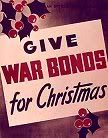
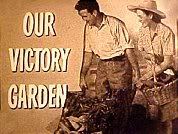
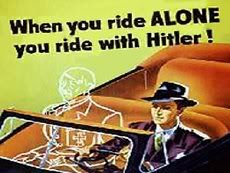
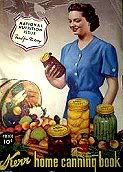
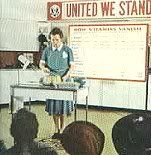
Home economists showed us how to save time and money for the war effort
|
_________________________________________________
|
|
|
RetroLisa
| ___________________________________________________________________ | __ | _____________________________ | _______ | Life In The Military
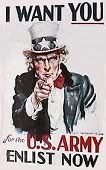
In preparation for what was to come, the draft became law in September 1940 for all men between the ages of 21 and 36. The first inductees were chosen in October 1940.
USO clubs & dances
The United Service Organization (USO) was formed in 1941 to give soldiers a "home away from home" while on leave. Before America entered World War II, USO clubs provided recreation for servicemen based in the states. Once we were in the war, the USO set up canteens overseas.
USO lounges could also be found in many American train stations. Here, servicemen could find ping-pong tables, libraries, lunch counters and telephones. Directly after the war, these lounges provided a great deal of assistance to returning servicemen on their way home.
All across the country, thousands of women volunteered at their local USO club, where soldiers could meet with friends, have something to eat and dance with a pretty girl. In the larger cities, some clubs even provided overnight accomodations for servicemen on shore leave.
Although the young people were chaperoned and dating the soldiers was strictly forbidden, sometimes romance blossomed. Churches, museums, barns and railroad cars were used to host USO activities when space was tight. There were 3,035 clubs in the United States....that's a lot of coffee and doughnuts!
USO: Our Proud History | |
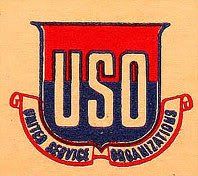
|
| ________________________________________________ | ___ | ______________________________________________ | ________ | how's that again?
Servicemen had their own unique way of talking....
food & drink
- make-believe cake -- day-old bread
- jungle juice -- home-brewed booze made by servicemen in the Pacific
- armored cow -- canned milk
- battery acid, paint remover -- army coffee
- ptomaine domain -- mess hall
- KP duty -- kitchen police duty, assisting the cook
women
- Dear John letter -- your girl back home is breaking up with you
- hershey bar -- prostitute with low rates
- pro-pack -- envelope containing condom, soap and astringent for protection against VD
- sugar report -- letter from your sweetheart
- skirt patrol -- looking for women
general
- gung ho -- dedicated & enthusiastic
- snafu -- situation normal: all fouled up
- socked in -- bad weather preventing takeoff
- S.O.P. -- standard operating procedure
- tarfu -- things are really fouled up
- G.I. -- government issue, any military object, action or person
jobs
- dogface -- U.S. Army infantryman
- G.I. Jesus -- chaplain
- jumping Jesus -- chaplain in paratrooper unit
- pollywog -- sailor who hasn't crossed the equator
- meter reader -- co-pilot
- beans -- cook
- sparks -- radio operator
- cowboy -- tank driver
- frogman -- scuba diver
- ping jockey -- one who monitors radar or sonar
- bloomer boys -- paratroopers
- gunny -- gunnery sergeant
| |
WACS (Women's Auxiliary Corps)
- gruesome twosome -- regulation shoes
- WAC shack -- WAC barracks
- wolfing -- looking for men
health & hygiene
- blanket drill -- sleep
- brown bombers -- laxatives
- stocks and bonds -- toilet paper
- pecker checker -- doctor who checks soldiers for VD
- short-arm inspection -- checking soldiers for VD
- sawbones -- army doctor or surgeon
- bean shave -- extremely short military haircut
war is hell
- blitz -- heavy air raid
- flak -- anti-aircraft fire
- milk run -- easy air mission
- lead poisoning -- death or injury from a bullet
equipment & locations
- flattop -- aircraft carrier
- Mae West -- inflatable life vest
- PX -- post exchange, army merchandise store
- cat stabber, frog sticker, cheese toaster -- bayonet

- jeep, blitz buggy -- the olive-green vehicles used by the army were known as General Purpose vehicles...or GPs. This term was shortened into the now familiar jeep
The Jeep
|
| ___________________________________________________________________ | __ | _____________________________ | _______ | mmmm....yummy!
*Spam, Spam and more Spam!
*C-Rations: a set of six small cans containing food for one day. Each meal used two cans. One contained baked beans, hunks of meat and vegetables, and another had candy and crackers. Soldiers kept them in their backpacks for field use.
*K-Rations: food for one day, plus cigarettes, gum, water purification tablets, matches and "tropical" chocolate that wouldn't melt in hot weather.
C-Rations
K-Rations
everyday life
*Our soldiers received information, news from home and musical entertainment from Armed Forces Radio, the Stars & Stripes newspaper, the weekly magazine Yank, V-Discs and Voice Of America via short-wave radio.
*There was always room for humor. In addition to the Private Snafu training cartoons, there were comic strips in the military newspapers. In Stars & Stripes you could read about "Willie & Joe," and in Yank you could laugh along with "Sad Sack."
*Occasionally, a USO Traveling Show would come around, and everyone would be treated to the music of Kay Kyser and the comedy of Bob Hope. A visit from Glenn Miller's band was also a high point.
*Military censors examined all mail heading back to the states, and edited out any passages that revealed troop locations or other sensitive information.
*There's nothing better than shore leave!
*The next-best thing to shore leave? Letters from home! It doesn't matter how ordinary the news is...we want to hear it all.
Kilroy was here!
It didn't matter where you were, if an American serviceman had been there, the familiar Kilroy was here grafitti would be there, too. Kilroy left his imprint all over the world!
pin-ups
A little "cheesecake" brightened up even the dreariest wall. Betty Grable and Rita Hayworth were the top subjects, but any movie star or pretty girl would do!
Stars & Stripes
Rita, The Pin-Up Girl
The Barracks Wall: WWII Pinups
Yank Magazine
Sad Sack
Kilroy Was Here
Voice Of America
Yank Magazine Archives
Visit my For The Boys section to learn
about entertainment for our servicemen!
showing the boys a good time
When our soldiers were on leave or preparing to ship out, port cities made an extra effort to show them a good time. In addition to the USO clubs, many entertainment venues and Broadway theaters admitted soldiers in uniform for free or greatly reduced rates.
"Even if you got money, they don't let you spend it."
--a soldier comments on city hospitality
| |
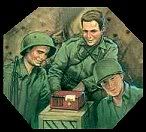

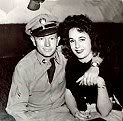
|
_________________________________________________
|
|
|
